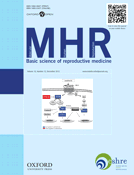
MOLECULAR HUMAN REPRODUCTION
metrics 2024
Innovating Understanding in Human Reproductive Science
Introduction
MOLECULAR HUMAN REPRODUCTION, published by Oxford University Press, is a pivotal journal dedicated to advancing the field of reproductive biology. Since its inception in 1995, the journal has been recognized for its rigorous peer-reviewed research and substantial contributions to the understanding of molecular mechanisms underlying human reproduction. With an impressive impact factor and ranked within the top tiers (Q1 and Q2) across diverse categories including Embryology, Obstetrics and Gynecology, and Reproductive Medicine, it stands as an essential resource for researchers, healthcare professionals, and students alike. The journal aims to publish cutting-edge research that explores the complexities of human reproduction at the molecular and cellular levels, fostering a deeper understanding that can be translated into clinical practice. Although it currently operates under a subscription model, the valuable insights and groundbreaking findings featured within its pages continue to influence the trajectory of reproductive health research globally. Located in the heart of Oxford, United Kingdom, the journal remains committed to addressing vital challenges in the field and promoting innovative scientific dialogue.
Metrics 2024
 1.20
1.20 3.60
3.60 3.90
3.90 138
138Metrics History
Rank 2024
Scopus
IF (Web Of Science)
JCI (Web Of Science)
Quartile History
Similar Journals

Reproduction and Fertility
Exploring the frontiers of fertility science.Reproduction and Fertility is a premier academic journal published by BIOSCIENTIFICA LTD, dedicated to advancing knowledge in the fields of reproductive sciences, obstetrics, gynecology, and related areas. Established with a focus on delivering high-quality research, this journal has quickly ascended in prominence, achieving a commendable Q2 ranking in multiple categories, including Embryology, Obstetrics and Gynecology, Reproductive Medicine, and Urology, as of 2023. With an E-ISSN of 2633-8386, Reproduction and Fertility aims to provide a valuable platform for researchers, professionals, and students alike, offering insights into the latest discoveries and innovations in reproductive health. Although currently not an open-access journal, it remains committed to disseminating important findings that can influence clinical practices and policy-making worldwide. Operating from its headquarters in Bristol, United Kingdom, the journal serves as an essential resource for anyone invested in understanding and improving reproductive health outcomes through rigorous academic research.

MOLECULAR REPRODUCTION AND DEVELOPMENT
Unraveling the secrets of reproduction and development.MOLECULAR REPRODUCTION AND DEVELOPMENT is a prestigious peer-reviewed journal published by WILEY, specializing in the intricate domains of Cell Biology, Developmental Biology, and Genetics. Since its inception in 1988, this journal has been a vital platform for disseminating pioneering research and innovative methodologies that advance our understanding of molecular mechanisms driving reproduction and development. With a current impact factor reflective of its significance in the field, MOLECULAR REPRODUCTION AND DEVELOPMENT is ranked Q3 in both Cell Biology and Developmental Biology, and Q2 in Genetics, underscoring its relevance and scholarly contribution. Catering to a diverse audience of researchers, professionals, and students, this journal not only showcases cutting-edge findings but also aims to foster interdisciplinary exchanges that enhance scientific collaboration. By exploring critical biological processes, it ultimately contributes to the broader understanding of health and disease in various organisms, making it an essential resource for anyone dedicated to the life sciences.
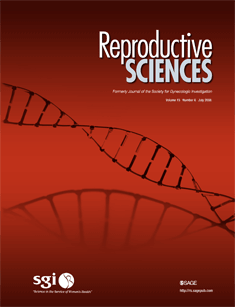
Reproductive Sciences
Pioneering Research for a Healthier FutureReproductive Sciences is a premier journal published by SPRINGER HEIDELBERG, dedicated to the field of obstetrics and gynecology. With its ISSN 1933-7191 and E-ISSN 1933-7205, the journal has established itself as a leading source of high-quality research and clinical insights since its inception in 2007, and continues to converge its scope into 2024. Currently ranked in the Q1 category for obstetrics and gynecology, it holds the 43rd position among 209 journals in the Scopus rankings, underscoring its influence and relevance within the medical community. This journal is particularly dedicated to advancing knowledge in reproductive health, providing a platform for innovative research and clinical practices through both traditional and open access options. Located in Switzerland with an address in Heidelberg, Germany, Reproductive Sciences is not just a publication; it is a vital resource for researchers, professionals, and students seeking to make impactful contributions to the field of reproductive health.

International Journal of Fertility & Sterility
Fostering Collaboration for Fertility SolutionsThe International Journal of Fertility & Sterility, published by ROYAN Institute, is a leading academic platform dedicated to advancing knowledge in the fields of obstetrics, gynecology, and reproductive medicine. With an ISSN of 2008-076X and an E-ISSN of 2008-0778, this Open Access journal has been making significant contributions to the scientific community since its inception in 2007. Based in Tehran, Iran, the journal showcases rigorous research and promotes interdisciplinary collaboration, addressing critical topics related to fertility, sterility, and reproductive health. As of 2023, it holds an impressive Q2 ranking in Obstetrics and Gynecology and a Q3 ranking in Reproductive Medicine, underscoring its relevance and impact in the academic sphere, with Scopus ranks placing it at #67 in Obstetrics and Gynecology and #32 in Reproductive Medicine. The journal's commitment to accessibility and quality is reflected in its global readership, making it an essential resource for researchers, healthcare professionals, and students seeking to enhance their understanding of fertility issues and reproductive technologies.
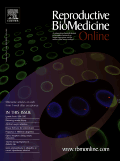
REPRODUCTIVE BIOMEDICINE ONLINE
Shaping the future of reproductive biomedicine with impactful research.Reproductive Biomedicine Online, published by Elsevier, is a leading peer-reviewed journal that has established itself as a pivotal resource in the fields of Developmental Biology, Obstetrics and Gynecology, and Reproductive Medicine. With an impressive Impact Factor and a Q1 ranking in its respective disciplines as of 2023, this journal provides a platform for innovative research and comprehensive reviews that contribute to advancements in reproductive healthcare. The journal boasts rigorous Scopus rankings, placing it within the top tiers of its categories, which underscores its significance in shaping contemporary biomedical inquiry. Although not open access, it remains widely accessible through institutional subscriptions, making its wealth of knowledge available to researchers, clinicians, and students alike. Since its inception in 2000, Reproductive Biomedicine Online has been committed to fostering a deeper understanding of reproductive processes and biomedicine, ensuring that its content remains relevant and impactful in addressing challenges in reproductive health, thereby championing exceptional scientific discourse.
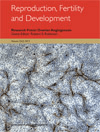
REPRODUCTION FERTILITY AND DEVELOPMENT
Connecting researchers to the latest breakthroughs in fertility and development.Reproduction, Fertility and Development, published by CSIRO Publishing, is a prestigious journal that has been at the forefront of research in the fields of reproductive science, developmental biology, and related disciplines since its inception in 1989. With an ISSN of 1031-3613 and an E-ISSN of 1448-5990, this journal serves as a vital platform for disseminating innovative findings and methodologies that advance our understanding of reproductive processes and development in a variety of organisms. The journal is indexed in prominent databases, exhibiting a solid standing with a Q3 quartile ranking in both Animal Science and Zoology and Biotechnology, and covering 2023 rankings in multiple related categories. Operating from Australia, Reproduction, Fertility and Development embraces a commitment to enriching scholarly communication and fostering collaborative research efforts. Its focus on high-quality, peer-reviewed articles makes it an essential resource for researchers, professionals, and students seeking to stay abreast of the latest advancements and pivotal discussions in reproductive medicine and developmental biology.
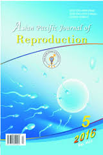
Asian Pacific Journal of Reproduction
Advancing Knowledge Across Species and DisciplinesAsian Pacific Journal of Reproduction is a dynamic open-access journal specializing in a diverse array of topics related to reproduction across various species, including humans, animals, and plants. Published by Wolters Kluwer Medknow Publications, this peer-reviewed journal has been committed to disseminating high-quality research since its inception in 2012. With an accessible ISBN of 2305-0500 and E-ISSN 2305-0519, the journal has rapidly established itself within the academic community, evidenced by its categorization in Q3 and Q4 quartiles across multiple fields, including Obstetrics, Gynecology, and Animal Science. Researchers are encouraged to contribute their findings to foster a deeper understanding of reproductive health and practices in the Asian Pacific region and beyond. The journal's inclusive scope and emphasis on interdisciplinary collaboration make it a crucial platform for professionals and scholars seeking to stay at the forefront of reproductive research.

THERIOGENOLOGY
Elevating animal science with cutting-edge insights.THERIOGENOLOGY is a prestigious academic journal published by Elsevier Science Inc, dedicated to the field of veterinary reproduction and animal science. With an impressive impact factor and recognized as a Q1 journal in various categories including Animal Science and Zoology, Equine, Food Animals, and Small Animals, THERIOGENOLOGY has established itself as a vital resource for researchers, practitioners, and students alike. Founded in 1974, the journal covers a broad spectrum of topics related to reproductive physiology, biotechnology, and the health management of food and companion animals. Although it does not currently offer open access, researchers can benefit from its comprehensive articles and reviews that push the boundaries of knowledge in veterinary science. With a significant placement in the Scopus rankings, ranking #1 in multiple veterinary categories, THERIOGENOLOGY serves as an essential platform for advancing the understanding of reproductive strategies and practices, thereby contributing directly to the fields of animal husbandry and veterinary medicine.

ZYGOTE
Pioneering Discoveries in Cell and Developmental Biology.ZYGOTE is a prominent academic journal published by Cambridge University Press, focusing on the fields of Cell Biology and Developmental Biology. Established in 1993, this journal serves as a platform for high-quality research that advances our understanding of the complex processes that underlie cellular and developmental mechanisms. While currently classified in the Q4 quartile for both fields, ZYGOTE provides valuable insights and contributions from early-stage research to established studies, making it a noteworthy resource for researchers and professionals seeking to explore innovative developments in biology. Although it does not offer open access, the journal maintains rigorous peer-review standards to ensure the integrity and relevance of the published work. With its ongoing commitment to disseminating knowledge, ZYGOTE plays a significant role in the scientific community, fostering collaboration and inspiration among students, researchers, and professionals alike.
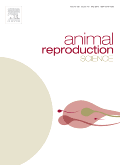
ANIMAL REPRODUCTION SCIENCE
Pioneering Insights into Reproductive MechanismsANIMAL REPRODUCTION SCIENCE, published by Elsevier, is a leading journal dedicated to the field of animal reproduction and developmental biology. With an ISSN of 0378-4320 and an E-ISSN of 1873-2232, it serves as a vital resource for researchers, professionals, and students interested in advancing their understanding of reproductive mechanisms across various species. The journal has been recognized for its high-quality contributions, achieving a Q1 ranking in Animal Science and Zoology and showcasing its significant impact in the areas of Endocrinology and Veterinary Medicine as per the 2023 category quartiles. Covering a wide range of topics from reproductive physiology to genetic implications, this journal not only highlights innovative research but also fosters interdisciplinary dialogue in the rapidly evolving world of animal science. Though not currently offering open access, it remains a crucial platform for disseminating pivotal research findings from across the globe. With its rich history dating back to 1936, ANIMAL REPRODUCTION SCIENCE continues to drive excellence in animal reproduction studies, positioning itself at the forefront of the field, and solidifying its relevance in both science and industry.